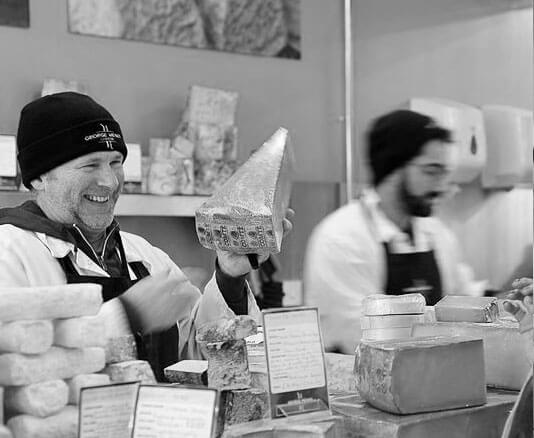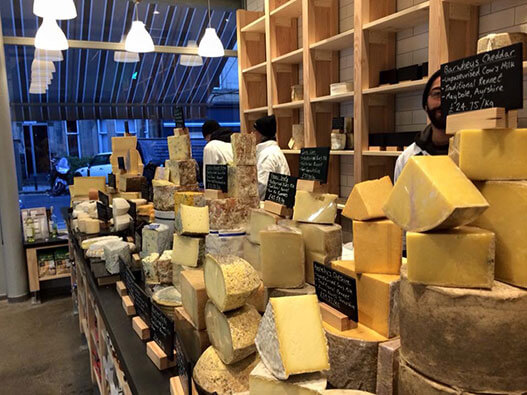FAQs
Choose from the finest cheese that the British Isles and Continental Europe have to offer.
We stock a wide range of washed rind cheese, blue mould cheese, soft cheese and the harder cheeses. For those who are on a special diet, we have a fantastic range of sheep and goat’s milk cheese.
All our large cheese is cut to order from the wheel, rather than being pre-packed.
Many of our cheeses are AOC, DOP or PDO, depending on their country of origin.
How do I care for my cheese?
- Always bring the cheese to room temperature before serving.
- When selecting a cheese board, go for cheese of different milk types – another good rule of thumb is goat, hard, soft, blue.
- Cheese should be served before any pudding – it doesn’t taste as good after the sweetness of a dessert.
- Cheese keeps better as a whole – it is better to buy a larger piece.
- Keep the cheese in the waxed paper we wrap it in as this keeps it in good condition and allows it to breathe, avoiding the build-up of excess moisture.
- Store cheese in a cool pantry, cellar or the refrigerator – but preferably on a lower shelf in a container.
- Do not store cheese with other strong-smelling foods. As a cheese breathes it will absorb other aromas and may spoil.
- How a cheese is cut depends on its shape and size. When cutting a cheese, divide it so that everybody has an equal share of the inside and outside.
How do I match cheese and wine?
- The whiter and fresher the cheese, the crisper and fruitier the wine should be.
- Sweet wine contrasts very well with a cheese of high acidity.
- Not all red wines match with cheese. Fruity, light reds are recommended.
- Dry, fresh red wines are more suited to soft cheeses, especially goat.
- Dry champagnes are a brilliant combination with bloomy white rinds like Brie or Camembert.
- Cheese and wine from the same region often work every well.
Some terms we use
- Affineur – A person who takes cheese from producers and matures it to perfection.
- AOC – In France, the Appellation d’Origine Contrôlée – Controlled Terms of Origin – lays down strict rules about how and where the cheese is produced, even extending to the breed of cows that provide the milk. Makers entitled to use the AOC designation must comply – if your French cheese is AOC, it’s the real deal.
- Annatto – An orange dye from a South American plant, which is used to colour cheeses, such as Mimolette and Shropshire Blue.
- Artisan – Artisan, farmhouse and traditional are often used interchangeably but we are usually referring to a small producer, making cheese with the milk of their own single herd.
- Aging – Curing or ripening cheese in controlled environments to develop the micro-organisms which contribute to the flavour.
- Bloomy Rind – Camembert and Brie have bloomy rinds, a light white down or powdery surface. The rind develops when the surface is sprayed with a Penicillium spore.
- Cave or Cellar – Usually an underground room or even a cave where ripening cheeses are stored and looked after. The humidity and temperature remain constant. Handcrafted Roquefort is ripened in caves.
- DOP – Like AOC, Denominazione di Origine Protetta is Italy’s guarantee that the milk and cheese production belong to a specific location.
- Fermier – What they call farmhouse cheese in France.
- Moulds – Blue veins in cheese are created by Penicillium glaucum or Penicillium roqueforti, mould spores which are introduced after the cheese has been pierced.
- PDO – Protected Designation of Origin. Enforced within the EU, it ensures that only products originating from a particular region can be sold under a particular name.
- Raw milk (unpasteurised) – Milk that has not been heat treated to destroy microbes and bacteria, unlike pasteurised milk.
- Rennet – The substance that curdles the milk. Traditional rennet is extracted from animal stomachs (calf, lamb, kid) while vegetarian rennet is derived from enzymes produced by a particular mould.
- Terroir – Everything that affects the flavour of the cheese – environment, geography, water and feed.
Washed rind – Cheeses have their rinds washed during curing to keep them moist and supple. Cheeses can be washed with salt water or even brandy, sometimes to promote the growth of a particular mould, which enhances the final flavour.


Our ethos is exquisite cheese – nothing less. We don’t deal in the ordinary. We specialise in unusual cheeses that can’t be found on most supermarket shelves. Every cheese has been personally tasted and approved by George because our customers deserve the best. To us that means artisan cheeses lovingly made by small producers who believe passionately in what they do.
George Mewes Cheese Glasgow
106 Byres Road | Glasgow | G12 8TB
T: 0141 334 5900
E: glasgow@georgemewescheese.co.uk
George Mewes Cheese Edinburgh
3 Dean Park St | Stockbridge | Edinburgh | EH4 1JN
T: 0131 332 5900
E: edinburgh@georgemewescheese.co.uk
